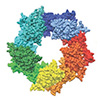| Apr 05, 2024 |
|
|
|
(Nanowerk News) Researchers at the Universitat Autònoma de Barcelona (UAB), in collaboration with the Sant Pau Research Institute and the CIBER-BBN, have developed micromaterials made up only of proteins, capable of delivering over an extended period of time nanoparticles that attack specific cancer cells and destroy them. The micromaterials mimic natural secretory granules found in the endocrine system and were proven effective in mouse models of colorectal cancer.
|
|
The research is published in Advanced Science (“Structural Stabilization of Clinically Oriented Oligomeric Proteins During their Transit through Synthetic Secretory Amyloids”).
|
|
A team coordinated by Professor Antonio Villaverde from the Institute of Biotechnology and Biomedicine of the Department of Genetics and Microbiology, UAB, and with the participation of the Sant Pau Research Institute and the CIBER-BBN, has developed self-contained micromaterials made up only of proteins that are capable of delivering over an extended period of time the polypeptide that composes them.
|
|
The technology used for the fabrication of these granules, patented by the researchers, is relatively simple and mimics the secretory granules of the human endocrine system. With regards to its chemical structure, it involves the coordination of ionic zinc with histidine-rich domain, an amino acid essential for living beings and therefore not toxic.
|
|
The new micromaterials developed by researchers are formed by chains of amino acids known as polypeptides, which are functional and bioavailable in the form of nanoparticles that can be released and targeted to specific types of cancer cells, for selective destruction.
|
|
The research team analyzed the molecular structure of these materials and the dynamics behind the secretion process, both in vitro and in vivo. In an animal model of CXCR4+ colorectal cancer, the system showed high performance upon subcutaneous administration, and how the released protein nanoparticles accumulated in tumor tissues.
|
|
“It is important to highlight that this accumulation is more efficient than when the protein is administered in blood. This fact offers an unexpected new way to ensure high local drug levels and better clinical efficacy, thus avoiding repeated intravenous administration regimens”, explains Professor Antonio Villaverde. “In the clinical context, the use of these materials in the treatment of colorectal cancer should largely enhance drug efficiency and patient’s comfort, while at the same time minimizing undesired side effects.”
|

